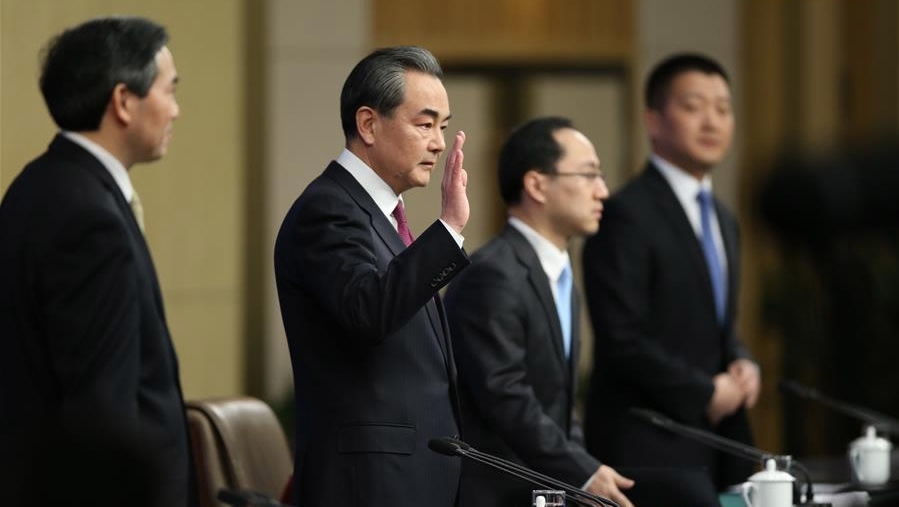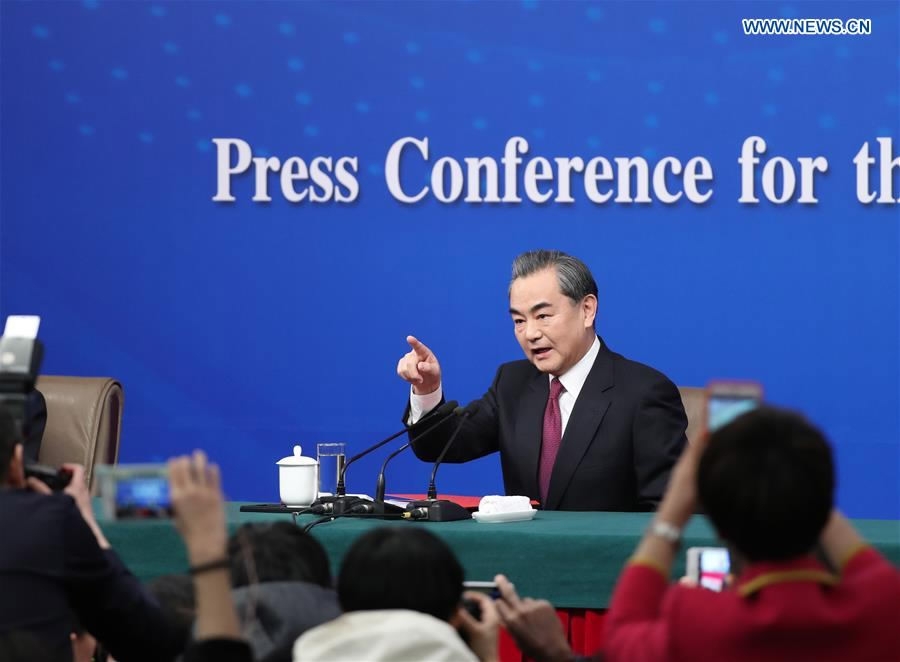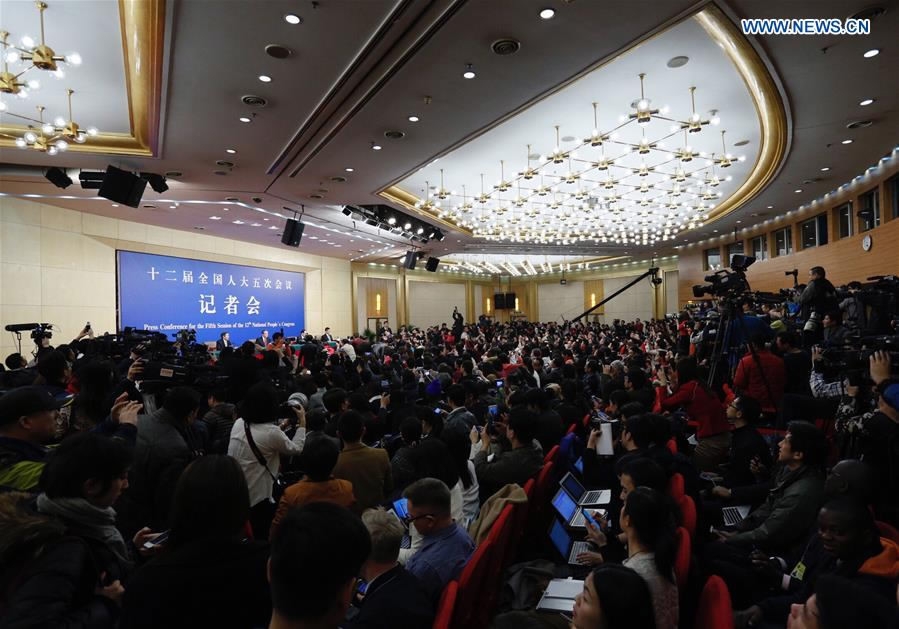
Politics
17:23, 09-Mar-2017
Views on Two Sessions: Can China create a new world without challenging the old world order?
Updated
11:00, 28-Jun-2018

Guest commentary by B.R.Deepak
On March 8, 2017, while meeting the media on the sidelines of the national legislature annual session, Chinese Foreign Minister Wang Yi expounded on his nation’s foreign policy on bilateral, regional, and multilateral levels. In effect, one may gauge the future course of China’s international engagement by what Wang Yi has said.
At the outset, he emphasized that, “China will continue to be an anchor of international stability, an engine of global growth, a champion of peace and development, and a contributor to global governance.” These pronouncements, in essence are demonstrative of China’s role in global affairs. This year’s Government Work Report has pegged China’s economic growth at 6.5 percent, a little less than the last year’s 6.7 percent. If we analyze China’s contribution towards global economic growth, it is phenomenal at over 30 percent. This is impressive as the global economy continues to limp to recovery with a lackluster growth closer to 3 percent. The contribution made by the largest economy of the world, the US, is just a quarter of the contribution to global growth, compared to the second largest. Undoubtedly, China will continue to be the engine of global growth in the world.

Chinese Foreign Minister Wang Yi takes questions on China's foreign policy and foreign relations at a press conference for the Fifth Session of the 12th National People's Congress in Beijing, March 8, 2017. /Xinhua Photo
Chinese Foreign Minister Wang Yi takes questions on China's foreign policy and foreign relations at a press conference for the Fifth Session of the 12th National People's Congress in Beijing, March 8, 2017. /Xinhua Photo
Secondly, I believe this momentum will be maintained, and the Belt and Road initiative of China will necessarily contribute to this momentum in a big way, for the trillion dollar initiative is an alternative to armed conflict and wars. ‘One Belt, One Road’ is China’s road map for global peace and prosperity, irrespective of the fact that it remains exposed to political, economic, security, environmental and legal risks. Some, though, have viewed the initiative as China’s ‘grand strategy’ for global hegemony, thus putting China at the center of geo-economics and geopolitics. The fact that over 65 countries are on board with the initiative, as well as 20 heads of state and government, over 50 leaders of international organizations and over 100 ministerial-level officials, is testimony to the fact that the initiative is regarded as a ‘win-win’ proposition to many, and an antidote to protectionism and unilateralism.
Thirdly, the Chinese foreign minister pledged the resolve of China to strengthen multilateralism and the UN related international system. There are concerns that China is challenging the existing institutions of global governance ever since it has been instrumental in founding the BRICS, AIIB, NDB and SCO institutions. Undoubtedly, while this does reflect the burgeoning economic and political clout of China, the foundations of such institutions in the past has strengthened and complemented the existing institutions, rather than diluted or diminished their role. Therefore, irrespective of China having bigger stakes in these institutions, these essentially remain geared towards catering to the needs of infrastructure development in the developing countries, devoid of the kind of strings the World Bank and IMF attach. From China’s perspective, it is the case of shouldering more responsibilities at global systems of governance rather than seeking leadership, as remarked by Wang Yi.

Chinese Foreign Minister Wang Yi takes questions on China's foreign policy and foreign relations at a press conference for the Fifth Session of the 12th National People's Congress in Beijing, March 8, 2017. /Xinhua Photo
Chinese Foreign Minister Wang Yi takes questions on China's foreign policy and foreign relations at a press conference for the Fifth Session of the 12th National People's Congress in Beijing, March 8, 2017. /Xinhua Photo
Finally, the foreign minister remains optimistic about China and the major power relationship between themselves and the US, irrespective of the uncertainties in the wake of US President Donald Trump’s election. He pointed out that the nations must "rise above the zero sum mentality" and work towards forging a robust and mature relationship. Rex Tillerson’s visit to Japan, Korea and China on March 15-19 may provide some clues as to where the relationship would be heading, albeit it could be emphasized that none would like to tread the path of confrontation. It was also perhaps in this context that Wang said that the China-US-Russia relationships should not be a "seesaw" game.
In a nutshell, China’s policy of ‘Three No's” (non interference in the internal affairs of other nations; not to seek the so called ‘sphere of influence’; and not to seek hegemony) will continue. Though it will not challenge US hegemony, it will oppose unilateralism, and yes, there would be red lines as far as China’s core interests are concerned, such as the South China Sea and Taiwan.
(Professor B. R. Deepak (狄伯杰) , Centre for Chinese and Southeast Asian Studies, Jawaharlal Nehru University, New Delhi India; Dr. Deepak has been a visiting professor at the Chinese Academy of Social Sciences, and Teaching Fellow at the Scottish Centre of Chinese Studies in the University of Edinburgh, UK. The article reflects the author's opinion, not necessarily the views of CGTN.)
52km

SITEMAP
Copyright © 2018 CGTN. Beijing ICP prepared NO.16065310-3
Copyright © 2018 CGTN. Beijing ICP prepared NO.16065310-3